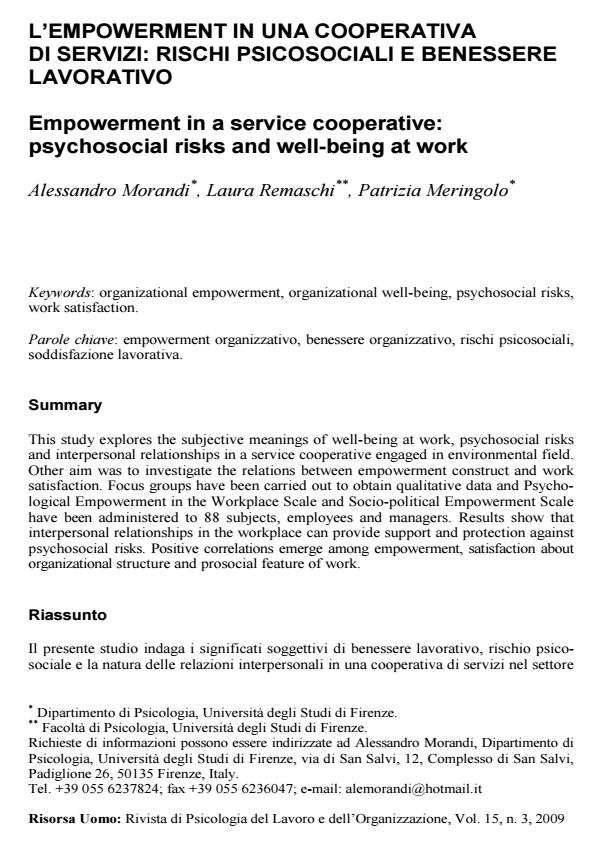L'empowerment in una cooperativa di servizi: rischi psicosociali e benessere lavorativo
Journal title RISORSA UOMO
Author/s Alessandro Morandi, Laura Remaschi, Patrizia Meringolo
Publishing Year 2009 Issue 2009/3
Language Italian Pages 17 P. 273-289 File size 281 KB
DOI 10.3280/RU2009-003005
DOI is like a bar code for intellectual property: to have more infomation
click here
Below, you can see the article first page
If you want to buy this article in PDF format, you can do it, following the instructions to buy download credits

FrancoAngeli is member of Publishers International Linking Association, Inc (PILA), a not-for-profit association which run the CrossRef service enabling links to and from online scholarly content.
Empowerment in a service cooperative: psychosocial risks and well-being at work - This study explores the subjective meanings of well-being at work, psychosocial risks and interpersonal relationships in a service cooperative engaged in environmental field. Other aim was to investigate the relations between empowerment construct and work satisfaction. Focus groups have been carried out to obtain qualitative data and Psychological Empowerment in the Workplace Scale and Socio-political Empowerment Scale have been administered to 88 subjects, employees and managers. Results show that interpersonal relationships in the workplace can provide support and protection against psychosocial risks. Positive correlations emerge among empowerment, satisfaction about organizational structure and prosocial feature of work.
Keywords: organizational empowerment, organizational well-being, psychosocial risks, work satisfaction.
Parole chiave: empowerment organizzativo, benessere organizzativo, rischi psicosociali, soddisfazione lavorativa.
- Organizational Wellbeing in CSOs in Morelos (Mexico): Findings from a Qualitative Study Imke Hindrichs, Arturo Juárez-García, Cristina Girardo, Daniela Converso, in Voluntas: International Journal of Voluntary and Nonprofit Organizations /2016 pp.348
DOI: 10.1007/s11266-015-9568-0
Alessandro Morandi, Laura Remaschi, Patrizia Meringolo, L'empowerment in una cooperativa di servizi: rischi psicosociali e benessere lavorativo in "RISORSA UOMO " 3/2009, pp 273-289, DOI: 10.3280/RU2009-003005